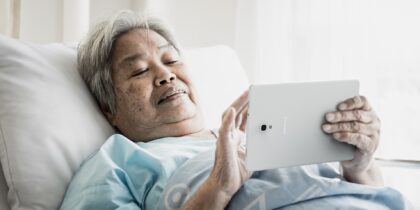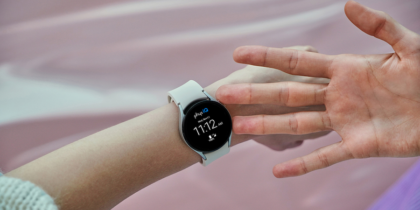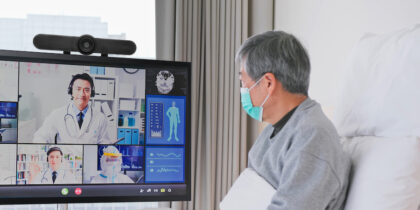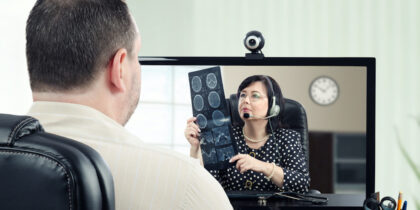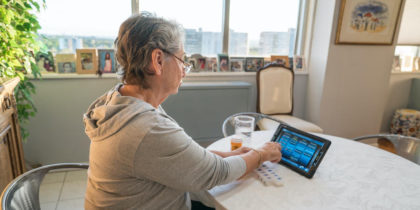Keeping patients closely connected to their caregivers is critical to achieving positive health outcomes. But busy schedules, long distances and understaffed departments can sometimes mean long hours alone for homebound patients, even when supported by the best caregivers.
Mobile technology strengthens connections, enabling smooth and convenient two-way communication that helps make caregivers more effective and drives better patient outcomes.
Here are some of the benefits of using mobile solutions for home healthcare.
1. Patients Have Better Access to Care
Better communication can become a lifeline for patients in need of home healthcare. Mobile solutions that are quick to access or which can be worn comfortably all day long make it simple for patients, their families and their caregivers to stay in touch.
How Mobile Solutions Improve Patient Experience
Get your free guide to enhancing the patient experience with mobile technology. Download Now
Whether by video check-in or through a patient portal, digital interactions ensure an ongoing relationship after the patient is discharged. This constant connectivity allows patients and seniors to remain active, while being assured they can reach a caregiver or emergency services if needed. Mobile devices also allow a patient to send and receive texts or emails, receive alerts and even make calls. GPS functions help with tracking, and long battery life means the device is always ready when needed.
2. Fast, Accurate Diagnosis
Some patients find it difficult to travel to see their care providers. These people often rely on home health aides for the majority of their care. These aides serve as a link between the patient and their physician. Using tablets equipped with high-resolution cameras makes it easy for a home health aide to share an image of a patient’s wound, abrasion or other physical injury. Wearables such as the Samsung Gear S3 can monitor vital signs such as movement and heart rate and alert caregivers when a rapid change is detected. With these data, the doctor or nurse can make a diagnosis and prescribe care immediately. A faster diagnosis means faster, better care for the patient.
3. Replace Heavy, Battery-Draining Laptops
The work of home healthcare aides can be physically taxing. Most welcome any opportunity to lighten their load. That means home healthcare providers have been all too happy to trade in their unwieldy laptops for lighter, purpose-built mobile healthcare solutions. Tablets have the computing power to support multitasking and are far easier to carry from site to site than laptops. They also feature superior battery life, so workers can spend more time focused on their jobs and less time charging.
4. Monitoring Without Sacrificing Independence
Most adults enter their senior years with a desire to remain in their own homes and maintain their independence as long as possible. Customizable devices like smartwatches can help them achieve those goals. Wearables like the Gear S3 look like any other premium watch, but also add the functionality of instant communication and health monitoring apps that can be configured to the specific needs of the wearer. Devices can track health data like heart rate, sleep and activity, and settings can be adjusted so healthcare teams or family members are alerted if those measures fall outside of acceptable ranges.
5. Devices Tailored for Caregiving Functions
With tools like Samsung Knox Configure, IT administrators can customize the end-user experience. IT teams can tailor tablets with only the specific applications that home health aides need to do their jobs. Administrators can manage the connectivity, content controls and device settings of each device. This makes the tablets simpler to use and more secure — plus, it removes memory-hogging applications and bloatware so the device lasts longer between battery charges.
6. HIPAA-Compliant Devices Keep Patient Data Secure
Physicians, nurses and healthcare aides often use mobile devices to collect, review and transmit the private health information of patients. To protect this critical data, the devices they use must deliver HIPAA-ready device security. Samsung tablets, smartphones and wearables come equipped with Samsung Knox, which provides defense-grade security that sets the bar in the mobile market. That security is built into devices and offers protection from the chipset up to the application layer. In combination with a Mobile Device Management solution, IT administrators can monitor and secure enterprise data across their entire fleet of devices. Home health aides stay connected and patient data remains secure.
Take a deeper dive into mobile healthcare technology in this free white paper on how to improve the patient experience.

